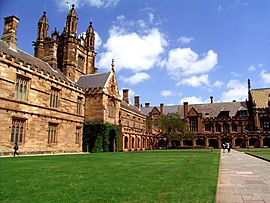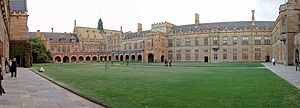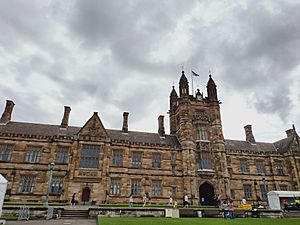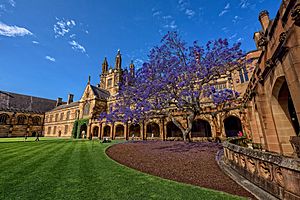University of Sydney Quadrangle facts for kids
Quick facts for kids University of Sydney Quadrangle |
|
|---|---|

The Quadrangle, pictured in 2005
|
|
| Alternative names | University of Sydney Main Quadrangle |
| General information | |
| Status | Complete |
| Architectural style | Victorian Academic Gothic Revival |
| Location | The University of Sydney, Parramatta Road, Camperdown, Sydney, New South Wales |
| Country | Australia |
| Coordinates | 33°53′09″S 151°11′20″E / 33.8859°S 151.1888°E |
| Construction started | 1854 |
| Completed | 1966 (West Tower) |
| Technical details | |
| Material | Sydney sandstone |
| Design and construction | |
| Architect |
|
|
Invalid designation
|
|
| Official name | Main Building and Quadrangle Group, University of Sydney Including Interiors |
| Type | Local government heritage (built) |
| Criteria | a., c., d., e., f. |
| Designated | 14 December 2012 |
| Reference no. | I84 |
| Type | Education |
| Category | University |
The University of Sydney Quadrangle is a famous building complex. It is made of Sydney sandstone and is located at The University of Sydney in Camperdown, Sydney, Australia. People also call it The University of Sydney Main Quadrangle. This important building and its inside areas were recognized as a heritage site on December 14, 2012.
The Quadrangle was built over many years, from 1854 to 1966. It was designed in a style called Victorian Academic Gothic Revival. Many people helped design it, including Edmund Blacket, James Barnet, and Leslie Wilkinson. The first part, including the Great Hall, was built between 1855 and 1862. By 1926, the Quadrangle had four sides, and it was fully finished in 1966.
The Quadrangle includes the Great Hall, MacLaurin Hall, the Faculty of Arts office, and the Nicholson Museum. MacLaurin Hall was built from 1902 to 1904 by Walter Liberty Vernon. Most of the building is made from Sydney sandstone. It was once the largest public building in the colony. The main entrance is under a clock tower. This tower holds one of only two carillons (a musical instrument with bells) in Australia.
The land where the Quadrangle stands traditionally belongs to the Cadigal and Wangal tribes of the Eora people.
Robert Strachan Wallace, who was the university's leader from 1928 to 1947, worked to improve the Quadrangle. He found the grounds messy and helped restore them.
Contents
Exploring the Quadrangle's Design
The design of the Quadrangle was inspired by famous universities like Oxford and Cambridge in England. It has one of only three carillons in Australia. The other two are in Canberra and Bathurst.
The Quadrangle is part of the "Sandstone Universities" group, which are Australia's oldest universities. It was the first building for Australia's first university. The style it was built in, Victorian Gothic Revival, was already old-fashioned when construction began. Edmund Blacket, one of the architects, also designed St Andrew's Cathedral in Sydney. His style influenced James Barnet's work on other university buildings. The Quadrangle's outer walls were completed in the 1960s, including work on the West Tower.
Amazing Gargoyles and Grotesques
You can find many gargoyles on the Quadrangle's walls and towers. Some gargoyles are waterspouts, helping drain water from the buildings. Others are just for decoration, and these are called 'grotesques'. These figures are common in Neo-Gothic medieval architecture. They were traditionally believed to ward off evil spirits.
Long ago, gargoyles often looked like mythical creatures. Later, stonemasons started adding real animals. You can see both types of creatures on the Quadrangle. In the 1850s, stonemasons Joseph Popplewell, Edwin Colley, and Barnet worked on the clock tower gargoyles.
Some gargoyles at the Quadrangle are unique because they mix Australian plants and animals with traditional medieval designs. For example, there's a kangaroo gargoyle on the clock tower. Inside the clock tower, you can find a crocodile gargoyle. Look above the entrance to the northern foyer, and you'll see kookaburras!
Next to the Quadrangle is the university's Great Hall. It has a large organ designed by Rudolf von Beckerath.
The Famous Jacaranda Tree
A beautiful jacaranda tree was planted in the Quadrangle in 1928. Professor E. G. Waterhouse, who loved gardening, planted it. This tree was very popular and was often in the background of graduation photos and other events. Sadly, it died in 2016. Students used to believe that when the tree bloomed, it was a sign that exams were coming, and they should start studying!
The Philosophy Room Murals
Inside the Quadrangle, the Philosophy Room has two special murals. These paintings were revealed on November 14, 1921. Norman Carter painted them to celebrate 30 years of work by Professor Francis Anderson.
One mural shows famous thinkers like Socrates, Aristotle, and Plato. The other mural features Descartes, Bacon, and Spinoza. Professor Anderson's wife unveiled both murals.
Caring for the Quadrangle Grounds
The University of Sydney has a plan to take care of its grounds, including the Quadrangle. Since it's a very popular and photographed area, it needs to look its best. Here are some of the rules for keeping the plants and trees healthy:
- Policy Seven: If important trees, like the jacaranda tree, get very old or die, they should be replaced with the same kind of tree.
- Policy Eight: Trees and plants that make the heritage buildings look good, like the famous purple jacaranda tree and the green grass, must be protected. Ropes and barriers are often put up to stop people from walking on new grass.
- Policy Nine: Plants like the ivy on the archway should be trimmed regularly. This helps keep views clear and makes sure people can easily access areas.
 | Sharif Bey |
 | Hale Woodruff |
 | Richmond Barthé |
 | Purvis Young |




